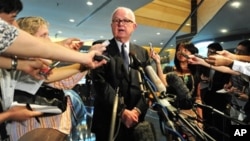Increased engagement with reclusive North Korea is seen as a signal the tension on the Korean peninsula may be softening.
South Korea's Foreign Ministry Thursday urged Pyongyang to demonstrate action if it wants nuclear talks to resume.
Ministry spokesman Kim Young-sun says that improving inter-Korean relations and moving toward the six-party talks are inseparable.
Kim says unlike previously, negotiations on six-party talks should start with the ultimate aim of ending North Korea's nuclear program. That way, he says, the rest of the world will know whether Pyongyang is truly willing to take such steps.
North Korea's leader, Kim Jong Il, recently pledged to revive the talks. Since then, there various overtures have come from Pyongyang.
In Beijing, Stephen Bosworth, the top U.S. envoy on North Korea, said the other five nations in the talks will continue to exchange views. But he says "the burden is quite clearly" on North Korea to make the talks happen.
"It is their actions and their activities, and their statements that will make, over time, will determine whether or not the talks can resume and whether the talks will be successful," Bosworth said.
Among the signs that Pyongyang is edging back toward nuclear talks is a meeting set for Friday between the Red Cross societies of North and South Korea. They hope to resume stalled reunions of families separated since the Korean War of the early 1950's.
On Thursday officers from the United Nations Command and the North Korean army held discussions about the sinking of a South Korean navy ship.
An international investigation blamed the sinking of the Cheonan last March on a North Korean torpedo, an accusation Pyongyang denies.
The U.N. Command, led by the United States, monitors the Korean War armistice of 1953.
U.S. military officials say the colonel-level talks lasted nearly three hours and are part of a mechanism to ease tensions that started in 1998. The current discussions are primarily intended to arrange a meeting of general-ranking military officials.
Pyongyang also has asked Seoul for military talks to discuss maritime boundary issues and propaganda leaflets that human rights activists send into the North.
While North Korea is seeking meetings with South Korea and the U.N. Command, it appears to have postponed a rare gathering of its Workers' Party to elect new leaders. Official announcements in the North indicated it would be held early this month. But there is no sign it has begun.
Speculation about the cause of the delay ranges from recent serious flooding to concerns about the health of leader Kim Jong Il.










